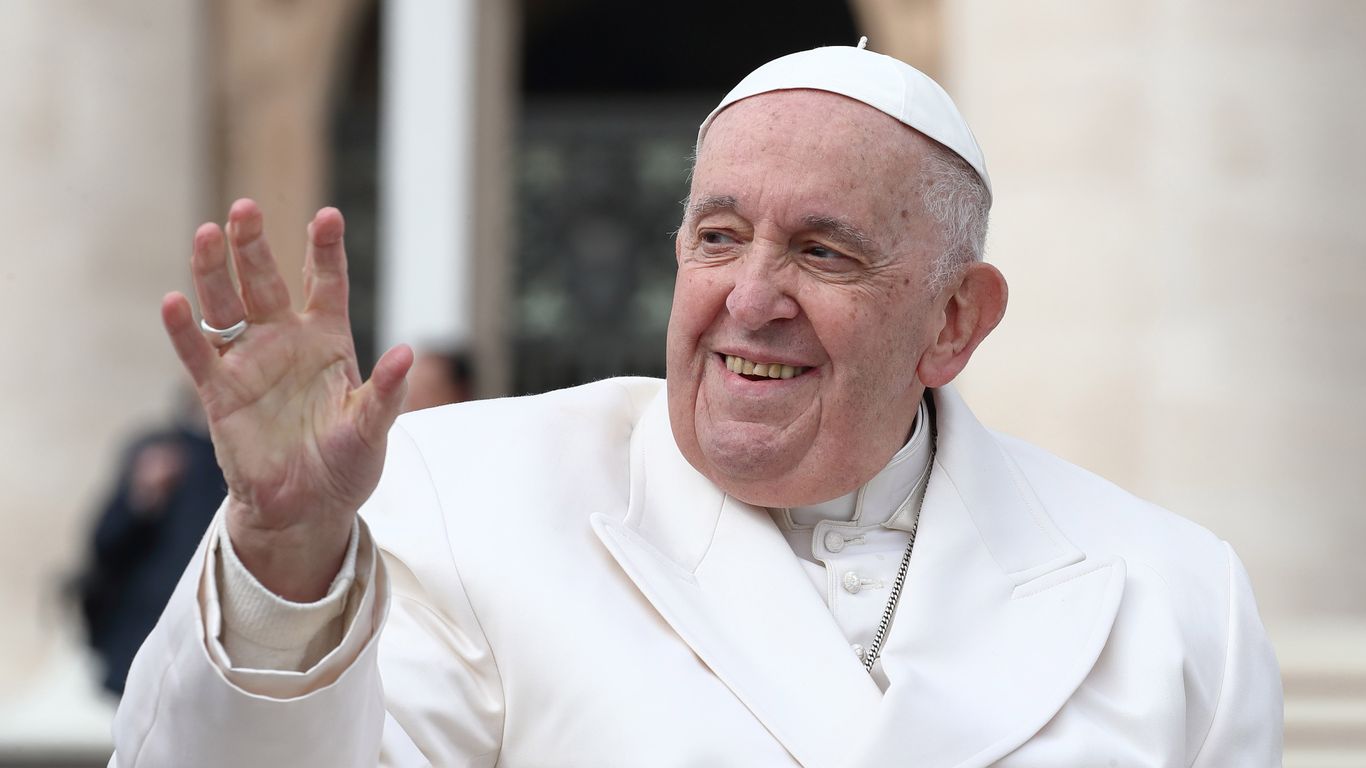Pope Francis died on Easter Monday at age 88, the Vatican announced.The big picture: Pope Francis pushed the Catholic Church to the left, which satisfied Catholics seeking modernization but dismayed traditionalists.Francis, who had part of his lung removed in 1957, was released from hospital on March 23 after being treated for double pneumonia after being admitted with bronchitis symptoms five weeks earlier.
Details: The Vatican said in a statement that Francis died on Monday morning at his residence in the Vatican's Casa Santa Marta."At 7:35 this morning, the Bishop of Rome, Francis, returned to the home of the Father. His entire life was dedicated to the service of the Lord and of his Church," said Cardinal Kevin Ferrell, the Vatican camerlengo, in the announcement.

The pope met briefly with Vice President JD Vance at the Vatican on Easter Sunday.Zoom out: Francis was elected in March 2013 and was tasked with cleaning up a scandal-ridden Vatican.In recent years, he expressed support for the LGBTQ community and for same-sex civil unions, which the church has traditionally marginalized.
Francis also pushed for years to improve the gender balance in the Roman Catholic Church, increasing the number of women working at the Vatican, including those in leadership positions.Zoom out: The pontiff was outspoken on oft-politicized issues. He urged nations to welcome and safeguard immigrants and called for action to combat climate change.
He recently spoke against the Trump administration's mass deportations, urging followers of his faith "not to give in to narratives that discriminate" against migrants and refugees.In an interview last year, he characterized climate change as "a road to death" denied by "foolish people."Throughout his pontificate, Francis advocated for marginalized groups.
In a book published last year, he called for an investigation into whether Israel's military actions in Gaza legally constituted genocide.He also often emphasized the mission of caring for the poor, speaking out against inequality in his native Latin America and beyond.Friction point: His candor and liberal view of a more inclusive Roman Catholic Church at times earned him rebuke from some members of an institution often reluctant to change.
Asked about criticism from conservative U.S. bishops, he said they had a "suicidal attitude.
"There is a distinction between taking "tradition into account" and being "closed up inside a dogmatic box," he contended.Born Jorge Mario Bergoglio, he took the name Francis when he became pope.He was born in Buenos Aires, Argentina, making him the first pope from the Americas and the first from outside Europe since the 8th century.
Francis was also the first pope to be a member of the Society of Jesus, also known as the Jesuit order.What's next: The College of Cardinals, composed of senior Vatican administrators and worldwide diocese leaders, will elect a new pope.They typically meet within 15 to 20 days after the pope's death to choose his successor by secret ballot.
Go deeper: Pope Francis championed historically progressive stancesEditor's note: This a breaking news story. Please check back for updates..
Pope Francis dies on Easter Monday at 88

Pope Francis died on Easter Monday at age 88, the Vatican announced.The big picture: Pope Francis pushed the Catholic Church to the left, which satisfied Catholics seeking modernization but dismayed traditionalists.Francis, who had part of his lung removed in 1957, was released from hospital on March 23 after being treated for double pneumonia after being admitted with bronchitis symptoms five weeks earlier.Details: The Vatican said in a statement that Francis died on Monday morning at his residence in the Vatican's Casa Santa Marta."At 7:35 this morning, the Bishop of Rome, Francis, returned to the home of the Father. His entire life was dedicated to the service of the Lord and of his Church," said Cardinal Kevin Ferrell, the Vatican camerlengo, in the announcement.The pope met briefly with Vice President JD Vance at the Vatican on Easter Sunday.Zoom out: Francis was elected in March 2013 and was tasked with cleaning up a scandal-ridden Vatican.In recent years, he expressed support for the LGBTQ community and for same-sex civil unions, which the church has traditionally marginalized.Francis also pushed for years to improve the gender balance in the Roman Catholic Church, increasing the number of women working at the Vatican, including those in leadership positions.Zoom out: The pontiff was outspoken on oft-politicized issues. He urged nations to welcome and safeguard immigrants and called for action to combat climate change.He recently spoke against the Trump administration's mass deportations, urging followers of his faith "not to give in to narratives that discriminate" against migrants and refugees.In an interview last year, he characterized climate change as "a road to death" denied by "foolish people."Throughout his pontificate, Francis advocated for marginalized groups.In a book published last year, he called for an investigation into whether Israel's military actions in Gaza legally constituted genocide.He also often emphasized the mission of caring for the poor, speaking out against inequality in his native Latin America and beyond.Friction point: His candor and liberal view of a more inclusive Roman Catholic Church at times earned him rebuke from some members of an institution often reluctant to change.Asked about criticism from conservative U.S. bishops, he said they had a "suicidal attitude."There is a distinction between taking "tradition into account" and being "closed up inside a dogmatic box," he contended.Born Jorge Mario Bergoglio, he took the name Francis when he became pope.He was born in Buenos Aires, Argentina, making him the first pope from the Americas and the first from outside Europe since the 8th century. Francis was also the first pope to be a member of the Society of Jesus, also known as the Jesuit order.What's next: The College of Cardinals, composed of senior Vatican administrators and worldwide diocese leaders, will elect a new pope.They typically meet within 15 to 20 days after the pope's death to choose his successor by secret ballot.Go deeper: Pope Francis championed historically progressive stancesEditor's note: This a breaking news story. Please check back for updates.













